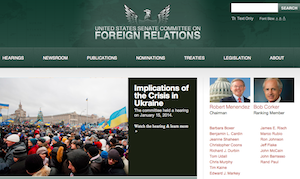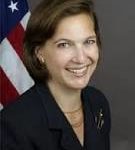BBG Watch Commentary
 The Voice of America (VOA) English news website failed to report on a strong condemnation by a U.S. State Department official of attacks on journalists in Ukraine, even though a day earlier the Broadcasting Board of Governors (BBG), which oversees VOA, issued a press release that “harassment, intimidation and attacks on independent journalists, including of those of Radio Free Europe/Radio Liberty and the Voice of America, have spiked in the wake of mass protests in Kyiv, Ukraine.”
The Voice of America (VOA) English news website failed to report on a strong condemnation by a U.S. State Department official of attacks on journalists in Ukraine, even though a day earlier the Broadcasting Board of Governors (BBG), which oversees VOA, issued a press release that “harassment, intimidation and attacks on independent journalists, including of those of Radio Free Europe/Radio Liberty and the Voice of America, have spiked in the wake of mass protests in Kyiv, Ukraine.”
Also on January 14, BBG Chairman Jeff Shell issued a strong statement on behalf of the BBG which condemned the Russian government’s denial of a visa to David Satter, an RFE/RL journalist adviser. Also on the same day, State Department spokesperson Marie Harf expressed “disappointment” over the denial of a journalist’s visa to David Satter.
The VOA English news website also had failed to post any reports on these earlier State Department’s and BBG Chariman’s statements in support of media freedom in Russia, as it failed to post anything on a hearing Wednesday by the Senate Committee on Foreign Relations to consider the implications of the crisis in Ukraine for U.S. foreign policy in the region. Attacks on Ukrainian journalists emerged as one of the key topics during the hearing.
Unlike VOA, Radio Free Europe / Radio Liberty posted on its website a comprehensive report in English on the Senate Committee hearing on Ukraine, even though RFE/RL is not required to specialize in U.S. news reporting focusing on U.S. foreign policy. “U.S. Senate Discusses Ukraine Crisis After Kyiv Court Bans Protest Rallies,” RFE/RL, Jan. 15, 2014. RFE/RL concentrates on internal news in countries without free media, but from time to time it reports on U.S. foreign policy when such news directly affects these countries.
Legislation passed by U.S. Congress assigned news reporting on U.S. foreign policy primarily to the Voice of America. VOA had an option of using the RFE/RL report on the Senate hearing. VOA failed to post it on its main news website.
VOA Charter requires the Voice of America “to present the policies of the United States clearly and effectively, and … also present responsible discussions and opinion on these policies” (Public Law 94-350), while BBG’s stated mission is “to inform, engage and connect people around the world in support of freedom and democracy.”

In this most recent example of disregard for VOA Charter, VOA’s main website and the vast majority of VOA’s more than 40 language websites did not report on a strong pro-media freedom statement by Thomas O. Melia, Deputy Assistant Secretary of State at the Bureau of Democracy, Human Rights and Labor, who testified Wednesday at a hearing of the U.S. Senate Foreign Relations Committee.
Critics blame such critical news reporting lapses on VOA’s top executives. They accuse them of failing to plan for such mission-oriented news coverage while using resources for expansion of bureaucracy and non-political reporting. Recent examples of misplaced priorities on the part of VOA executives included dozens of VOA news reports in English and in other languages on the British royal family events. Most VOA journalists are opposed to such fluff journalism, but the management has ignored their protests. VOA has some of the worst employee morale among federal agencies.
Deputy Assistant Secretary of State Thomas O. Melia told the U.S. Senate Foreign Relations Committee Wednesday that Ukraine’s government “has failed to consistently respect the rights of freedom of speech and press.” VOA English news website failed to report on this pro-media freedom statement by a high-raking U.S. official while posting a video report on the National Bottle Museum in Saratoga County, New York.
“Thomas O. Melia: Ukraine’s ratings for media freedom by international groups, such as Freedom House and Reporters without Borders, have declined for three years in a row.
Interference with and pressure on media outlets by the government has increased, including the government’s tolerance of increased levels of violence toward journalists. Both media owners and journalists at times yield to government pressure and intimidation by practicing self-censorship. There is also an emerging pattern of targeted intimidation and violence against journalists and activists brave enough to speak out.
According to the Institute of Mass Information (IMI), a respected Ukrainian media watchdog, there were more than 100 attacks and cases of intimidation against journalists in 2013 – nearly half of these occurred in December. In addition, IMI recorded 120 cases of obstruction of journalists’ professional activities, 51 cases of censorship, 44 cases of economic and political pressure, and 5 arrests and detentions. The U.S Government will continue to speak out frankly and forcefully against violence, intimidation, and repression whenever and wherever it occurs, as we have in recent weeks with regard to the appalling and brutal beating of Tatiana Chornovol on Christmas Day.”

It appears that VOA’s Ukrainian Service and Russian Service may have been the only ones covering the hearing on Ukraine. The majority of the population in eastern Ukraine speaks Russian, rather than Ukrainian, as their primary language.
Assistant Secretary of State for European and Eurasian Affairs Victoria Nuland, who was the main witness, made a specific reference to eastern Ukraine:
Assistant Secretary of State for European and Eurasian Affairs Victoria Nuland: “We will also work with the EU to support their efforts to disseminate reliable information on what European integration really means to the Ukrainian public, especially in the East, and to counter false narratives and fear-mongering.”
VOA English Service and other VOA language services, many of which provide news to countries such as Iran and China where journalists face persecution and restrictions on their work, could have benefited from a VOA report indicating a strong U.S. interest in supporting media freedom in Ukraine. Unfortunately, VOA failed to provide such a report, even though Ukraine and attacks on journalists continue to be in the news almost daily for many weeks since the crisis in Ukraine has intensified.

The hearing was chaired by U.S. Sen. Robert Menendez (D-NJ), Chairman of the Senate Foreign Relations Committee:
Sen. Robert Menendez (D-NJ): “Let me say that I met earlier this month with members of New Jersey’s Ukrainian diaspora, and they asked me to bring attention to the thousands of protestors in Maidan Square who want a voice in the future of their country. I’d like to assure them today that this Committee isn’t deaf to those brave people whose capacity for hope and appetite for freedom has compelled them to take to the streets.
The world is, indeed, watching.”

U.S. Senator Bob Corker, (R-Tenn.), ranking member of the Foreign Relations Committee, criticized the Obama administration:
Senator Bob Corker (R-Tenn): “Apparently overly concerned with offending Russia, the administration seems to have somehow made the calculation initially that a passive response might yield more than assertive U.S. leadership. I think it’s important to ask now, with Russia gaining at our expense in Syria, Iran, on missile defense, Edward Snowden, and now Ukraine, whether that was the right approach.”
Nuland refuted that charge.
Assistant Secretary of State for European and Eurasian Affairs Victoria Nuland: “We have made clear consistently, both publicly and privately, that the coercive actions of Russia, not only against Ukraine but also against Moldova and Georgia, are violations of many undertakings that they have made including Helsinki principles and in some cases [World Trade Organization] obligations, and we will continue to be absolutely clear about that,” Nuland said.

Senator John McCain (R-Arizona): “[Ukraine] is a country that wants to be European,” McCain said. “They don’t want to be Russian. That’s what this is all about. That’s what the EU means to them. The Russians have used energy. They’ve even cut off chocolate. They have bullied. They have supported the corruption, which is rampant in Ukraine.”
Dr. Zbigniew K. Brzezinski,a former U.S. National Security Advisor and current Counselor and Trustee at the Center for Strategic and International Studies was also a witness at the Wednesday’s “Implications of the Crisis in Ukraine” hearing of the U.S. Senate Committee on Foreign Relations.
It is unfortunate that except for the VOA Ukrainian Service and the Russian Service, apparently no other VOA language service reported on this hearing and official U.S. comments on attacks on journalists in Ukraine. VOA English news website failed to report on this important U.S. foreign policy event in Washington.